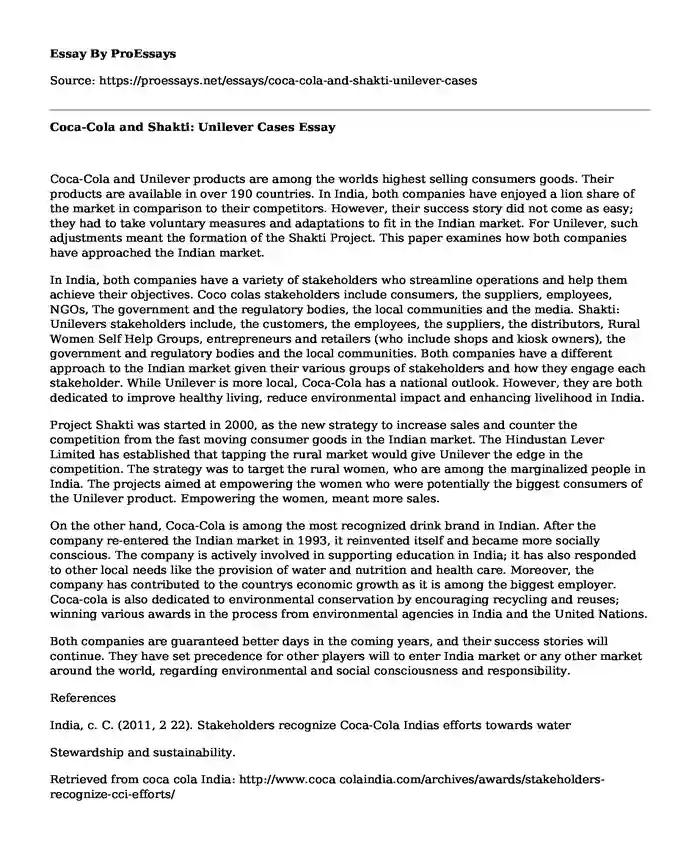Coca-Cola and Unilever products are among the worlds highest selling consumers goods. Their products are available in over 190 countries. In India, both companies have enjoyed a lion share of the market in comparison to their competitors. However, their success story did not come as easy; they had to take voluntary measures and adaptations to fit in the Indian market. For Unilever, such adjustments meant the formation of the Shakti Project. This paper examines how both companies have approached the Indian market.
In India, both companies have a variety of stakeholders who streamline operations and help them achieve their objectives. Coco colas stakeholders include consumers, the suppliers, employees, NGOs, The government and the regulatory bodies, the local communities and the media. Shakti: Unilevers stakeholders include, the customers, the employees, the suppliers, the distributors, Rural Women Self Help Groups, entrepreneurs and retailers (who include shops and kiosk owners), the government and regulatory bodies and the local communities. Both companies have a different approach to the Indian market given their various groups of stakeholders and how they engage each stakeholder. While Unilever is more local, Coca-Cola has a national outlook. However, they are both dedicated to improve healthy living, reduce environmental impact and enhancing livelihood in India.
Project Shakti was started in 2000, as the new strategy to increase sales and counter the competition from the fast moving consumer goods in the Indian market. The Hindustan Lever Limited has established that tapping the rural market would give Unilever the edge in the competition. The strategy was to target the rural women, who are among the marginalized people in India. The projects aimed at empowering the women who were potentially the biggest consumers of the Unilever product. Empowering the women, meant more sales.
On the other hand, Coca-Cola is among the most recognized drink brand in Indian. After the company re-entered the Indian market in 1993, it reinvented itself and became more socially conscious. The company is actively involved in supporting education in India; it has also responded to other local needs like the provision of water and nutrition and health care. Moreover, the company has contributed to the countrys economic growth as it is among the biggest employer. Coca-cola is also dedicated to environmental conservation by encouraging recycling and reuses; winning various awards in the process from environmental agencies in India and the United Nations.
Both companies are guaranteed better days in the coming years, and their success stories will continue. They have set precedence for other players will to enter India market or any other market around the world, regarding environmental and social consciousness and responsibility.
References
India, c. C. (2011, 2 22). Stakeholders recognize Coca-Cola Indias efforts towards water
Stewardship and sustainability.
Retrieved from coca cola India: http://www.coca colaindia.com/archives/awards/stakeholders-recognize-cci-efforts/
Vakil, m. (2004). Shakti: Unilever collaborate with woman entrepreneurs in rural India. Integrative case 1.4.
Cite this page
Coca-Cola and Shakti: Unilever Cases. (2021, Mar 08). Retrieved from https://proessays.net/essays/coca-cola-and-shakti-unilever-cases
If you are the original author of this essay and no longer wish to have it published on the ProEssays website, please click below to request its removal:
- Marketing Essay Example: Factors that Affect Online Shopping Behavior
- Work-ready Skills: A Personal Action Plan Example
- Paper Example on Ineffective Strategic Change Due to Environmental Determinism
- COVID-19 Disrupting Global Supply Chains: Impact & Solutions - Essay Sample
- BI Organizations and Transforming Businesses - Free Paper Sample
- Paper Example on Leadership Through Tribal Understanding: A TED Talk by David Logan
- Optimizing University Website: Objectives and Metrics - Free Report







